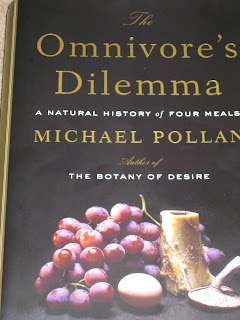
The Mystery Book that's been taking F-O-R-E-V-E-R for me to finish is The Omnivore's Dilemma by Pollan. Pollan tracks the origins of four meals: one from McDonalds, one of "organic" food, one of non-organic food, and one that he hunted and gathered.
The book is long.
Pollan is thorough. With the exection of the fact that he talks about corn for half of the book, I thought the thoroughness was warranted.
But book is very good. Pollan is a good writer, witty, charming, conversational, intelligent.
The reason that it too me so long is because there are definite agendas about this book and it's hard not to internalize them. I had to pause when I found myself seriously considering applying all of Pollan's agendas. For example: corn syrup . . . bad. So I was checking all labels. Industrialized meat: bad. So I was balking at buying frozen chicken breasts at Costco. Lentils from my favorite Indian supermarket: bad, they've been shipped overseas. See? I had to read a little while, pause, let my food habits stabilize, and then go back and read some more. I have changed my buying and eating habits some---I think that's the point---but I didn't want to push myself into culinary neurosis.
Here are some of the changes that I have tried to make:
1. I do, actually, avoid corn syrup. Why does it need to be in processed tomato sauce anyway?
2. I do cook more vegetarian meals. Lentils, beans, that sort of thing.
3. I do try to buy local. I make exeptions for important things like pineapple and chocolate.
4. I do eat free range beef. It's the beef that wanders my dad's back pasture, actually, so I know exactly where the cow was raised.

Here's a sample of food that I think Pollan would approve of:
1. Strawberry jam, made by my mother, from the berries she bought down the road from her house.
2. Beef from my dad's cows. He raises them. Names them---I once had a roommate who wouldn't eat my beef because it had a name. Better than having a number in a feedlot, I say.
3. A nectarine from the farmer's market by my house.
4. Yogurt with no corn syrup.
So now Mystery Book has been completed. It was a lovely feast. Enjoy.

